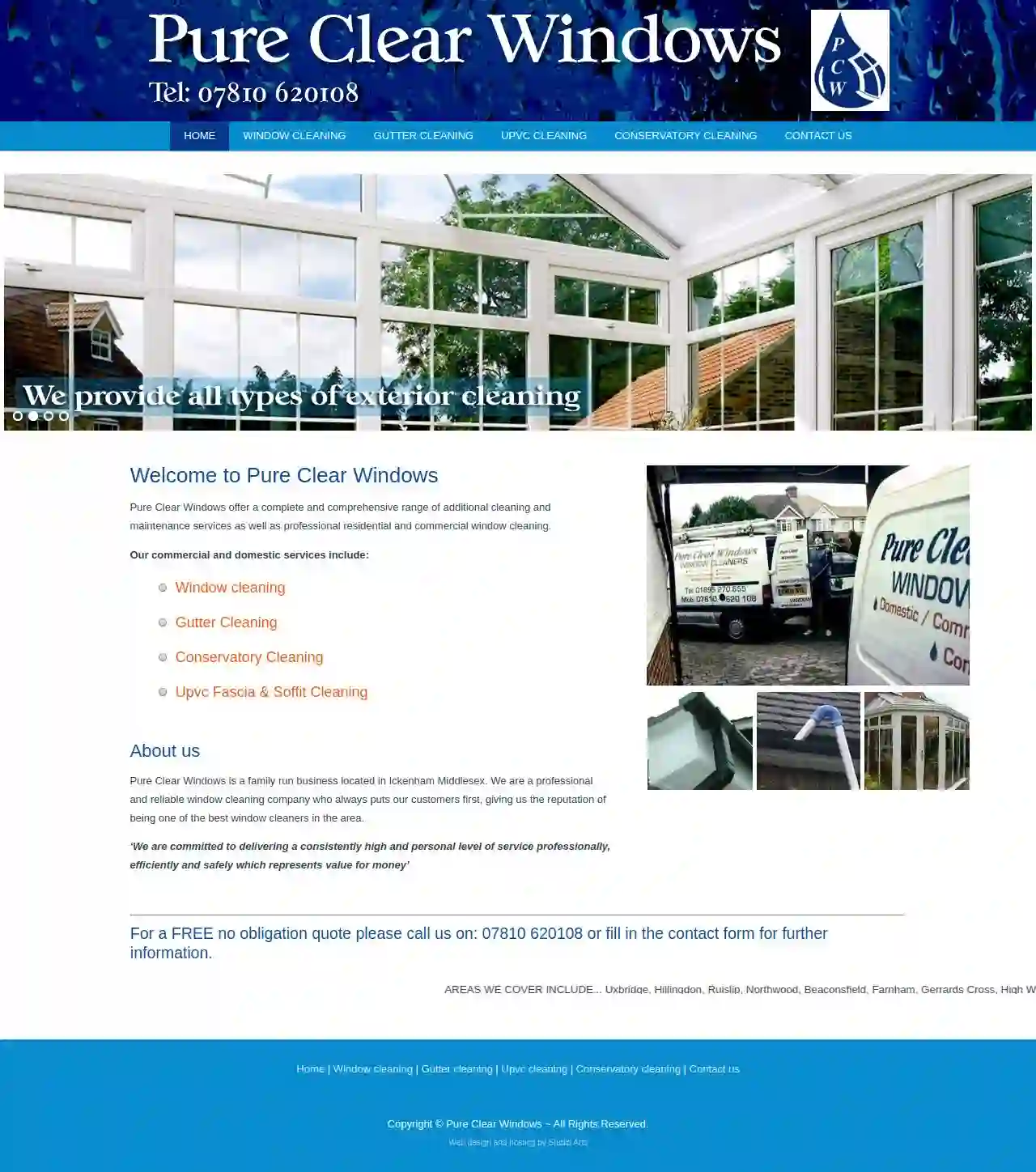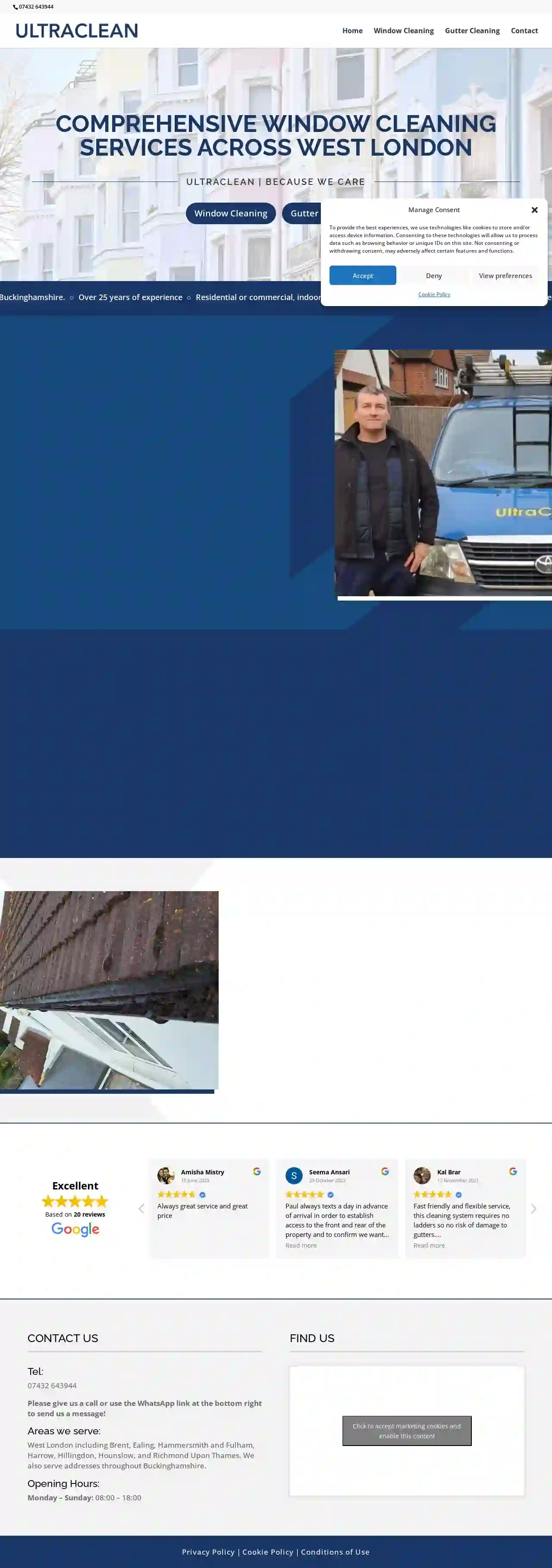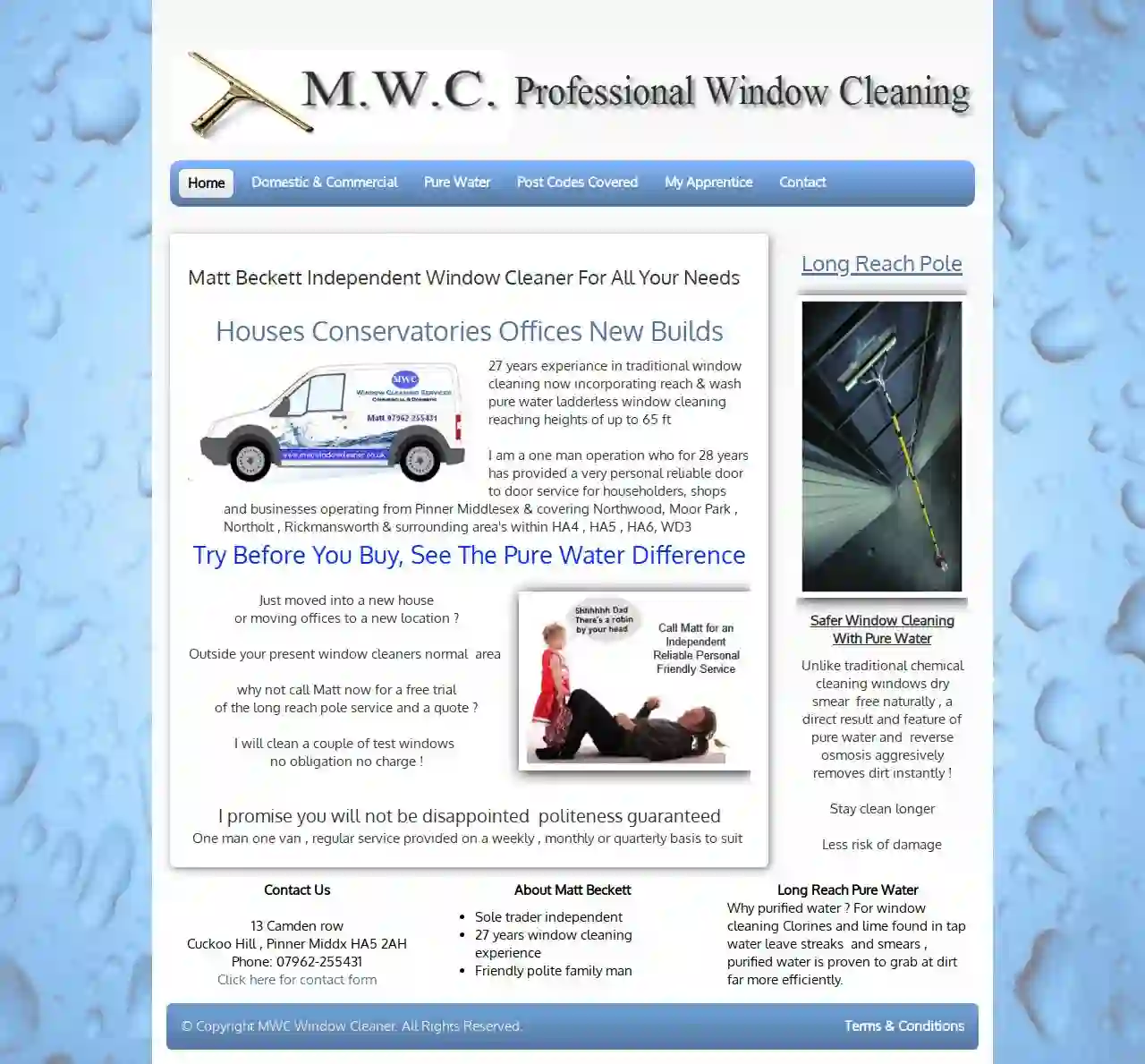Window Cleaning Harrow Weald
Top 10 Commercial Window Cleaning in Harrow Weald
Receive multiple Professional Window Cleaning quotes for your project today! Compare profiles, reviews, accreditations, portfolio, etc... and choose the best offer.

Chris’s Exterior Cleaning
4.18 reviewsPinner, GBChris's Exterior Cleaning has been providing quality services with exceptional efficiency, and the highest level of professionalism since 2008. We provide an array of services that we guarantee will not only meet but exceed your expectations, offering 100% customer satisfaction. Our team is up for every job, managing projects with the skill and experience our clients have come to expect.
- Services
- Why Us?
- Our Team
- Gallery
Get Quote
Pure Clear Windows and Gutters
3.67 reviewsPinner, GBPure Clear Windows offer a complete and comprehensive range of additional cleaning and maintenance services as well as professional residential and commercial window cleaning. Our commercial and domestic services include: Window cleaning Gutter Cleaning Conservatory Cleaning Upvc Fascia & Soffit Cleaning Pure Clear Windows is a family run business located in Ickenham Middlesex. We are a professional and reliable window cleaning company who always puts our customers first, giving us the reputation of being one of the best window cleaners in the area. ‘We are committed to delivering a consistently high and personal level of service professionally, efficiently and safely which represents value for money’ For a FREE no obligation quote please call us on: 07810 620108 or fill in the contact form for further information.
- Services
- Why Us?
- Gallery
Get Quote
DW Maintenance & Exterior Cleaning
541 reviewsWest Drayton, London, DW Maintenance & Exterior Cleaning, UB7 9HN, GBLeading Exterior Cleaning West Drayton DW Maintenance & Exterior Cleaning was founded by Darren Sharp in February 2019. We pride ourselves on offering an exceptional service where we leave the job with happy and satisfied customers, every time. Since our inception, we’ve built a remarkable reputation. We’ve collected over 60 5-star rating reviews on Facebook, over 100 on Checkatrade, over 23 on Nextdoor, over 40 on our Google Business Profile, and 12 on Trustatrader. As a result of our service, we’re lucky to receive repeat custom from many of our domestic, industrial and commercial clients. If you’d like a free, no-obligation quote, call 07500 339486.
- Services
- Why Us?
- Our Team
- Testimonials
- Gallery
Get Quote
Ultraclean
519 reviewsUnknown, Uxbridge, GBUltraclean provides a window and guttering cleaning services for residential and commercial customers. Based in Uxbridge, we cover a wide area across West London, including Brent, Ealing, Hammersmith and Fulham, Harrow, Hillingdon, Hounslow, and Richmond Upon Thames. We have been cleaning windows since 1997. We use the pure water cleaning system with window type specific brushes (extra soft bristles for leaded windows etc). We have been using this method of cleaning since 2005 but also enjoy using the squeegee. We enjoy our work and love meeting people, we try to give an effective, efficient, and friendly service and receive positive feedback from many satisfied customers. If you need any window cleaning or guttering services in West London, please contact us for a FREE, no-obligation quote. We can provide a quote over the phone or over text. All you need to do is send us a picture of the property and your postcode. We can also visit your property and provide you with a quote. Get in touch for more information!
- Services
- Why Us?
- Testimonials
- Gallery
Get Quote
MWC Window Cleaner
52 reviews13 Camden Row, Pinner, HA5 2AH, GBMatt Beckett is an independent window cleaner with 27 years of experience in traditional window cleaning, now incorporating reach & wash pure water ladderless window cleaning, reaching heights of up to 65 ft. He is a one-man operation providing a very personal and reliable door-to-door service for householders, shops, and businesses operating from Pinner, Middlesex, and covering Northwood, Moor Park, Northolt, Rickmansworth, and surrounding areas within HA4, HA5, HA6, and WD3. He offers a free trial of the long reach pole service and a quote for new customers. His services include regular cleaning on a weekly, monthly, or quarterly basis to suit clients' needs.
- Services
- Why Us?
- Our Team
- Gallery
Get Quote
RS Brothers Window Cleaning
4.822 reviewsPinner, GBRS Brothers Window Cleaning is a local, family business run by two brothers; Adam and Liam. We pride ourselves on our professional and reliable window cleaning services. With years of experience, we have built a reputation for excellence in our community. Contact us today to learn more about us and how we can help. After building a strong reputation in the community, we were able to expand and cover a larger area to bring the same quality work to more people, personally. Liam covers Ashford & Middlesex, while Adam covers Hart & Rushmoor.
- Services
- Why Us?
- Our Team
- Gallery
Get Quote- Gl
Gleaming Window Cleaning
576 reviewsPinner, GB- Services
- Why Us?
Get Quote - Le
Leksander Cleaning Service
2.910 reviewsPinner, GB- Services
- Why Us?
Get Quote - Vi
Viewtiful Window Cleaning
51 reviewsPinner, GB- Services
- Why Us?
Get Quote
Over 35,055+ Janitorial Companies in our network
Our janitorial services operate in Harrow Weald & surroundings!
CleaningMatch has curated and vetted the Best Janitorial Businesses arround Harrow Weald. Find a top & trustworthy pro today.
Frequently Asked Questions About Window Cleaning
- Number of Windows: The more windows you have, the higher the cost will generally be.
- Size and Type of Windows: Large windows, multi-paned windows, or windows with special features (e.g., skylights) may cost more to clean.
- Accessibility: Windows that are difficult to reach (e.g., high-rise windows) will require specialized equipment and may cost more.
- Interior vs. Exterior: Cleaning both interior and exterior windows will cost more than cleaning just one side.
- Frequency: Regular cleaning schedules often come with discounted rates compared to one-time cleanings.
- Inspect Thoroughly: Check all windows carefully to identify any issues, such as streaks, missed spots, or damage.
- Document the Problems: Take photos or videos of any unsatisfactory areas to provide evidence.
- Contact the Company: Contact the window cleaning company immediately and politely explain the issues. Provide the documentation you gathered.
- Request a Redo: Ask the company to redo the cleaning in the unsatisfactory areas. Most reputable companies offer a satisfaction guarantee and will be willing to address your concerns.
- Leave a Review: If the company is unwilling to resolve the issues, consider leaving an honest review online to inform other potential customers.
- Twice a Year: Cleaning windows in the spring and fall is a common practice to remove dirt accumulated during the winter and pollen from the spring.
- Quarterly: If you live in a busy city or near a coast with salt spray, more frequent cleanings may be necessary.
- Monthly: For businesses, especially those with high foot traffic or prominent storefronts, monthly cleanings can help maintain a professional appearance.
How much does professional window cleaning cost?
To get accurate pricing, request quotes from multiple window cleaning companies. Be sure to provide detailed information about your windows and cleaning requirements.
What is the difference between traditional window cleaning and a water-fed pole system?
Traditional window cleaning involves using squeegees, buckets, and cleaning solutions. This method is effective for reaching lower windows and provides a hands-on approach to cleaning.
Water-fed pole systems use purified water and a telescopic pole with a brush head to clean windows from the ground. This method is ideal for reaching high windows, eliminating the need for ladders. Purified water dries without leaving streaks or spots, providing a spotless finish.
The choice between the two methods depends on the height and accessibility of your windows, as well as your personal preference.
What should I do if my window cleaner doesn't do a good job?
Clear communication, documentation, and a willingness to work towards a resolution can help address unsatisfactory window cleaning results.
How often should I have my windows cleaned?
You can adjust the frequency based on your needs and budget. Consider factors like the visibility of dirt and grime, your tolerance for dirty windows, and the overall appearance of your home or business.
How much does professional window cleaning cost?
- Number of Windows: The more windows you have, the higher the cost will generally be.
- Size and Type of Windows: Large windows, multi-paned windows, or windows with special features (e.g., skylights) may cost more to clean.
- Accessibility: Windows that are difficult to reach (e.g., high-rise windows) will require specialized equipment and may cost more.
- Interior vs. Exterior: Cleaning both interior and exterior windows will cost more than cleaning just one side.
- Frequency: Regular cleaning schedules often come with discounted rates compared to one-time cleanings.
To get accurate pricing, request quotes from multiple window cleaning companies. Be sure to provide detailed information about your windows and cleaning requirements.
What is the difference between traditional window cleaning and a water-fed pole system?
Traditional window cleaning involves using squeegees, buckets, and cleaning solutions. This method is effective for reaching lower windows and provides a hands-on approach to cleaning.
Water-fed pole systems use purified water and a telescopic pole with a brush head to clean windows from the ground. This method is ideal for reaching high windows, eliminating the need for ladders. Purified water dries without leaving streaks or spots, providing a spotless finish.
The choice between the two methods depends on the height and accessibility of your windows, as well as your personal preference.
What should I do if my window cleaner doesn't do a good job?
- Inspect Thoroughly: Check all windows carefully to identify any issues, such as streaks, missed spots, or damage.
- Document the Problems: Take photos or videos of any unsatisfactory areas to provide evidence.
- Contact the Company: Contact the window cleaning company immediately and politely explain the issues. Provide the documentation you gathered.
- Request a Redo: Ask the company to redo the cleaning in the unsatisfactory areas. Most reputable companies offer a satisfaction guarantee and will be willing to address your concerns.
- Leave a Review: If the company is unwilling to resolve the issues, consider leaving an honest review online to inform other potential customers.
Clear communication, documentation, and a willingness to work towards a resolution can help address unsatisfactory window cleaning results.
How often should I have my windows cleaned?
- Twice a Year: Cleaning windows in the spring and fall is a common practice to remove dirt accumulated during the winter and pollen from the spring.
- Quarterly: If you live in a busy city or near a coast with salt spray, more frequent cleanings may be necessary.
- Monthly: For businesses, especially those with high foot traffic or prominent storefronts, monthly cleanings can help maintain a professional appearance.
You can adjust the frequency based on your needs and budget. Consider factors like the visibility of dirt and grime, your tolerance for dirty windows, and the overall appearance of your home or business.